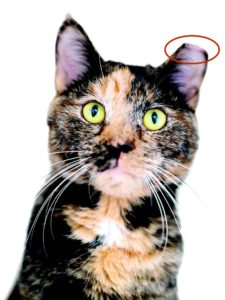 What is a community cat?
What is a community cat?
A community cat is a cat that lives outdoors and does not have a particular home or owner. They may be friendly, or in some cases, feral (not socialized with people). These cats typically depend on humans for their food, whether it is a neighborhood caretaker, dumpster, or other source.
Columbus Animal Care Services uses a Trap-Neuter-Vaccinate-Return (TNVR) process to help control the feral cat population in our area. You an identify a cat that has been part of this program by their clipped ear.
Due to COVID-19, the shelter has more limited access to spay/neuter surgery appointments, so there may be a delay on when trapping may begin in your area. Please call CACS to be added to the trapping list so we are made aware of the cats in your area. Thank you for your understanding.
Trap-Neuter-Vaccinnate-Return, commonly referred to as “TNVR”, is not only humane, but it is the most effective method for controlling feral cat population growth.
TNVR benefits the cats and the community. Using this technique, community cats living outside are trapped, neutered, vaccinated, ear-tipped (the universal symbol of a neutered and vaccinated cat), and then returned to their outdoor home.
The cats stay in a particular location because someone, a community cat caretaker, is feeding them in the area. They stay because of resources.
If you begin to trap and remove, other cats will move into the territory and will fill the space left by the removed cats. This is called the “vacuum effect”. The new unneutered cats integrate into the area and produce more kittens. This leads to calls for trapping and removing and the cycle continues. TNVR stops the cycle!
Whether you love or loathe community cats, Trap-Neuter-Vaccinate-Return effectively reduces the number of cats in colonies and in the community. TNVR stops the mating behaviors associated with spraying and yowling, making the cats better neighbors and healthier since the cats are vaccinated as well.
Advantages of TNVR
- It immediately stabilizes the size of the colony,eliminating new litters.
- The nuisance behaviors often associated with community cats is dramatically reduced; including the yowling, fighting, and the odor of unneutered males spraying to mark their territory.
- The returned cats guard their territory, preventingunneutered cats from moving in and beginning the cycle again.
- It reduces the number of kittens and cats flowing into local shelters. This results in lower euthanasia rates and higher adoption rates of cats already in shelters.
 First, check to see if the cat’s left ear is tipped (see sample at right). If so, the cat has already been spayed or neutered.
First, check to see if the cat’s left ear is tipped (see sample at right). If so, the cat has already been spayed or neutered.- If the cat’s ear is not already tipped, the best thing to do is to contact your local TNVR program to have the cat fixed and returned to his outdoor home.
- Friendly cats may be adopted into loving homes after they have been spayed or neutered
- The best place for kittens younger than eight weeks old is with their mother if at all possible. Please look for signs that a mother is present before automatically assuming kittens are abandoned. Mama may be in the process of moving them or just out looking for food.
- Feral kittens too old to be socialized (usually 3 months) should be trapped, spayed or neutered, vaccinated, ear-tipped and returned to their home territory.
- Friendly kittens can be taken into the shelter and placed into the adoption program as space allows. Please call the shelter to confirm if we have space.
Nationally, over 70% of cats taken to animal shelters will be killed there. There simply are too many cats. Columbus Animal Care Services works very hard to not euthanize animals for space reasons, but at certain times of the year, we are simply overloaded with animals. During these times, you may be asked to go on a waiting list. The Community Cat program ensures the cats are spayed or neutered, vaccinated and returned to their outdoor homes to prevent them from ever entering an animal shelter. TNVR is a widely supported program that allows more of the shelter’s time and resources to be spent getting socialized cats adopted while reducing the number of unwanted cats in the community.
Reason: They are looking for a warm, dry shelter.
Easy Solutions:
- Block open areas with lattice or chicken wire (be sure to check for hiding creatures first).
- Provide a shelter which can easily be obtained from Columbus Animal Care Services. For ideas on other easy, low-cost shelters, please visit www. Alleycat.org/Shelter Gallery.
Reason: Tomcats spray to mark their territory.
Easy Solutions:
- Contact Columbus Animal Care Services for information on how to conduct TNVR! Neutering stops the nuisance behaviors associated with mating such as spraying and yowling.
Reason: Food is left out too long or at inappropriate times.
Easy Solutions:
- Keep cat feeding areas neat to avoid insects.
- Feed cats at a designated time during the day (they will adjust accordingly).
- Only provide enough food to finish in one sitting. Remaining food should be taken in before twilight.
- Feed the cats in a discrete location – avoid putting food in public walkways or locations overly visible to public.
Reason: Yowling and fighting are breeding behaviors. Cats that are not sterilized breed frequently.
Easy Solutions:
Contact Columbus Animal Care Services for information on how to conduct TNVR! Spaying/neutering will reduce hormones causing these behaviors. Male cats will stop coming and more kittens will not be born.

